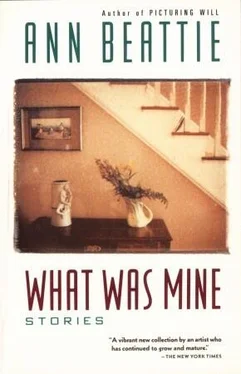Ann Beattie - What Was Mine
Здесь есть возможность читать онлайн «Ann Beattie - What Was Mine» весь текст электронной книги совершенно бесплатно (целиком полную версию без сокращений). В некоторых случаях можно слушать аудио, скачать через торрент в формате fb2 и присутствует краткое содержание. Год выпуска: 1992, Издательство: Vintage, Жанр: Современная проза, на английском языке. Описание произведения, (предисловие) а так же отзывы посетителей доступны на портале библиотеки ЛибКат.
- Название:What Was Mine
- Автор:
- Издательство:Vintage
- Жанр:
- Год:1992
- ISBN:нет данных
- Рейтинг книги:5 / 5. Голосов: 1
-
Избранное:Добавить в избранное
- Отзывы:
-
Ваша оценка:
- 100
- 1
- 2
- 3
- 4
- 5
What Was Mine: краткое содержание, описание и аннотация
Предлагаем к чтению аннотацию, описание, краткое содержание или предисловие (зависит от того, что написал сам автор книги «What Was Mine»). Если вы не нашли необходимую информацию о книге — напишите в комментариях, мы постараемся отыскать её.
What Was Mine — читать онлайн бесплатно полную книгу (весь текст) целиком
Ниже представлен текст книги, разбитый по страницам. Система сохранения места последней прочитанной страницы, позволяет с удобством читать онлайн бесплатно книгу «What Was Mine», без необходимости каждый раз заново искать на чём Вы остановились. Поставьте закладку, и сможете в любой момент перейти на страницу, на которой закончили чтение.
Интервал:
Закладка:
In October he and Francine went to Parents’ Night. He remembers the small corridor leading to Mrs. Angawa’s classroom, walks slowly to see if Julie’s name is signed to any of the crayoned pictures lining one wall.
“I’m very pleased to see you,” Mrs. Angawa says, springing up from her desk when he walks into the room. She walks toward him so quickly he fears they may collide. She takes his outstretched hand and shakes it. Since he stopped working, he rarely sees enthusiastic people.
She sits down, gesturing to the wooden chair beside her desk. There is a cushion on the chair. He settles himself on Mt. Fuji.
“I write you notes every month, but one-way communication is no good. If parents come to see me, many things may come up,” Mrs. Angawa says, cupping her hands over her knees.
“Of course,” he says. He can hardly argue with the logic of this. When Mrs. Angawa says nothing, but searches his face, Stefan says, “Every day I hear what Mrs. Angawa thinks. You’ve really impressed Julie. We’re very happy with her progress with reading and spelling, too.”
“Well, sure, she’s a very good speller.” Mrs. Angawa moves her chair back from her desk and crosses her legs.
“Everything is fine as far as we’re concerned. I suppose that since you haven’t said anything in your notes that concerns us, we might not have much to go over,” Stefan says.
“I don’t write everything in my notes,” Mrs. Angawa says. “For instance, we never grade children your daughter’s age. We’re just supposed to make remarks. Well, there are not too many remarks to make when a child is as good a student as your daughter, which is why I have said in my notes that maybe she seems just a little shy.”
“I think she is shy. She’s a very serious child. Also, she’s an only child. I think she’s used to … quiet.”
“Oh,” Mrs. Angawa says. “It’s not so noisy in here. I tell them to pipe down if there’s any unnecessary noise. I’m not a softie.”
“No, of course not,” he says. “I wasn’t being critical, at all. I just wanted to make the point that Julie may be quiet because she’s used to quite a bit of quiet at home.” He uncrosses his legs, shifts in the chair again. “I don’t mean that we don’t talk,” he says. “In fact, the other day in the store she had such a monologue going she could have been on stage.”
“She doesn’t say anything, and then it all comes out in a rush!” Mrs. Angawa says.
“You mean it’s that way in school? Is that a problem?”
“As long as someone says what she has to say, it’s not a problem as far as I’m concerned.”
“But as far as others are concerned?”
“Maybe she bores the boys a bit when she talks for a long time.”
He laughs uncomfortably. “Are you telling me something about her behavior, or—”
“Or something about boys? I can certainly tell you that boys at this age are not developmentally equal to the girls. And my personal belief? That there must be tolerance for the way people choose to express themselves.”
“Then she doesn’t go on too much? You’re not saying that she, you know, sounds like she’s giving a monologue?”
“You used that word before,” Mrs. Angawa says. “I don’t think of it as a monologue, I just think her thoughts are kept silent longer than most people would keep their thoughts to themselves, and they all come tumbling out.”
“This isn’t the way any other child expresses herself?”
“No,” she says.
“But aside from — aside from boring some of the boys when she speaks, do you consider it a problem that …”
“Sure, maybe for her.”
“Do people tell her to shut up, or something?”
“In my classroom? I teach them all to be polite. No one in this classroom would tell anyone else in this classroom to shut up. Please don’t worry about that. This is a small matter. I only bring it up because you may want to think about what causes Julie’s way of speaking.”
“Sometimes my wife speaks at great length,” he says. “The other night she wouldn’t really converse with me, even though I kept trying. She wasn’t refusing to answer, but we weren’t on the same wavelength. I — this doesn’t seem to the point. What I started to say is that often my wife comes out with something that’s quite long in the telling. Maybe Julie gets it from her.”
“There! Now we know what that’s about!” Mrs. Angawa says.
“But my wife — my wife isn’t there that much. I don’t mean that she’s never home, but my wife works, and I stay with Julie, and I’m not entirely sure …”
“They’re all great mimics,” Mrs. Angawa says. “Julie sees her mother doing that, she mimics her.” Mrs. Angawa opens a small notebook on her desk and flips a few pages. “Julie is very interested in good spelling. She is eager to learn new words. It is very good that she likes writing very much.” She closes the book. “What would we do if she wanted to talk, but she didn’t want to write? This is a problem I have with two of the students at the present moment.”
“Bobby Tompkins?” he says, hoping to change the subject for a moment. “I understand he’s something of a problem.”
“To your daughter?”
“No. To the class in general. I gather he Magic Markered his forehead to perform brain surgery recently.”
Mrs. Angawa looks surprised. “Is that why he did it?” she says. “I thought it might have been an accident. You don’t know the number of times each day someone stabs himself with a pencil, purely by accident. I didn’t know that he was performing brain surgery. I know that he whispered to your daughter, though. He seems to rely on your daughter. He is a little dependent. He does things to get attention, and I don’t think it’s so bad that sometimes he manages to get that attention.”
“And what about — what about the movie about a kidney transplant, or whatever it was?”
“He brings up inappropriate things at Show and Tell. He watched an adult movie, Steel Magnolias , and it upset him very much. He needed to talk about it the next day, and several children, including your daughter, became fascinated. I had to take several minutes to talk about organ transplants, to expand the topic a little and try to dispel their fears.” Mrs. Angawa opens her desk drawer. “By the way,” she says, “your daughter did not want her picture hung in the hallway, because she is shy, but I want to show it to you, because it is quite good. The students who feel they do not want their work displayed, for whatever reason, are never subjected to embarrassment.” She flips through several drawings before carefully extracting Julie’s.
It is a scene of mountains and a lake. Not until he breathes a sigh of relief does he realize that he had braced himself to see something disturbing.
On the way out, after shaking Mrs. Angawa’s hand, he turns suddenly, much to his own surprise, and asks where the rabbit is. “Julie talks about the rabbit so much, I feel it’s a member of the family,” he says.
“Oh, yes, bunny has really captured her imagination,” Mrs. Angawa says. “Now promise me you will believe me. The streetlights disturb bunny at night, so the janitor advised me to put the cage in the coat closet. I don’t want you to think I’m cruel to a bunny! First thing in the morning, I come in and take him out and put his cage in the nice sunshine. These days, everybody is always on the lookout for cruelty. As every child can tell you, I cried and cried when the previous bunny died. What they don’t know is that I’ve had nightmares that the same thing may happen to this one. Every morning I hurry in, praying that bunny is fine.”
She opens the door. The rabbit is in a large cage, stretched out by a water dish.
Читать дальшеИнтервал:
Закладка:
Похожие книги на «What Was Mine»
Представляем Вашему вниманию похожие книги на «What Was Mine» списком для выбора. Мы отобрали схожую по названию и смыслу литературу в надежде предоставить читателям больше вариантов отыскать новые, интересные, ещё непрочитанные произведения.
Обсуждение, отзывы о книге «What Was Mine» и просто собственные мнения читателей. Оставьте ваши комментарии, напишите, что Вы думаете о произведении, его смысле или главных героях. Укажите что конкретно понравилось, а что нет, и почему Вы так считаете.












